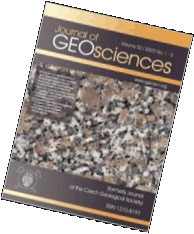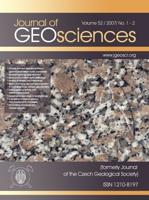Original Paper
Blue dravite as an indicator of fluid composition during subsolidus replacement processes in Li-poor granitic pegmatites in the Moldanubicum, Czech Republic
Journal of the Czech Geological Society, volume 43 (1998), issue 1-2, 24 - 30
Fibrous to needle-like blue dravite characterized by low and variable Fe/Mg ratios, low Ti, Mn, Li and F contents and locally elevated Ca contents was found at several localities of Li-poor granitic pegmatites in Moldanubicum, Czech Republic. These pegmatites commonly penetrate Ca, Mg-rich rocks such as dolomite-calcite marble and serpentinite. Blue dravite from Strážek and Věžná replaces cordierite in early stages of subsolidus crystallization at temperature above 450 to 500 °C, before relics of cordierite were completely replaced by a mixture of micaceous minerals. Simplified reaction may be expressed: 3Na0.4(Mg,Fe)2Al4Si5O18.nH2O + 3B(OH)3 + yH2O + zCaO = 2(Na,Ca)0.7(Mg,Fe)3Al6Si6O18(BO3)3(OH)4 + 3SiO2. Blue dravite from Blizna formed in relatively late stage of subsolidus process and it is closely associated with Ca, Mg-rich elbaite. Pegmatite-derived fluids in Li-poor pegmatites are characterized by high activity of B and low activities of F and Li. It is in a contrast with highly evolved Li-rich complex granitis pegmatites, where high activities of B, F and alkalis (Li, K, Rb, Cs) in pegmatite-derived fluids were observed. Metamorphic fluids are Ca, Mg-enriched, but their participation in the reaction is negligible to moderate. Significant influx of metamorphic fluids is assumed particularly during a low temperature formation of blue dravite in Bližná, but it was small during replacement of cordierite at localities Věžná and particularly Strážek.
Webdesign inspired by aTeo. Hosted at the server of the Institute of Petrology and Structural Geology, Charles University, Prague.
ISSN: 1803-1943 (online), 1802-6222 (print)
email: jgeosci(at)jgeosci.org


IF (WoS, 2023): 1.1
5 YEAR IF (WoS, 2023): 1.5
Policy: Open Access
ISSN: 1802-6222
E-ISSN: 1803-1943
 Export to Mendeley
Export to Mendeley